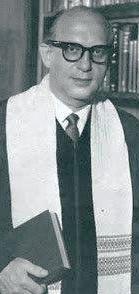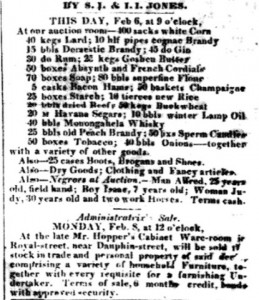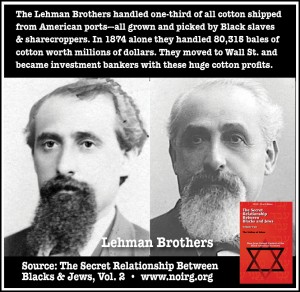Selma Should Give More “Credit” to Alabama Jews

Jewish Americans have complained that the movie Selma does not give proper credit to the Jewish participation in Black history. Alabama Jews, in fact, were quite prominent in helping to create the conditions under which Black people existed in Alabama history. Here is a report that sheds light on this important Jewish contribution. DOWNLOAD: The Secret Relationship Between Alabama’s Blacks and Jews
For instance, Birmingham’s Rabbi Milton Grafman publicly decreed: “The lives of one thousand Negroes are not worth a hair on the head of a single Jew.” Think about that statement, then think about the history of the Civil Rights Movement, and try to find a comparable anti-Black expression of grotesque inhumanity from any white Gentile segregationist.
The Secret Relationship Between
Alabama’s Blacks and Jews
By the mid 20th century Alabama had become the home of syphilis “studies” and midnight riders of the KKK, of segregation enforcer Eugene “Bull” Connor with his fire hoses and attack dogs, of church bombings and unspeakable racial terrorism. Here are some interesting facts about Alabama that most Blacks and Jews do not know:
- Jews established the first cotton gin in the state, which, by processing cotton many times faster than before, increased the demand for African slaves manifold.
- In Mobile, Jewish auctioneer George Davis was the city’s first to have “a monopoly on the sale of animals and slaves.”

Rabbi Israel I. Jones advertises the sale of Blacks into slavery
- Rabbi Israel I. Jones, who was called “a man of mental and moral superiority” and an “outstanding philanthropist,” served as mayor of Mobile and alderman and advertised the sale of Blacks into slavery (right).
- When the nation broke apart over the question of slavery, Alabama’s Jews served in the pro-slavery Confederate Army.
- Jews had no peers in the Alabama slavery economy. Wm. Frohlichstein and B. Moog were city aldermen and directors of National Commercial Bank, while Isaac Goldsmith was president of Commercial Savings Co., L. Brisk was a director of the Deposit Savings Bank, and William H. Leinkauf and M. Forchheimer were directors of Mobile Savings Bank.
- The Lehman Brothers, the founders of one of the most respected investment banking businesses in the world (now defunct), got their start selling slave-picked cotton not a stone’s throw from Montgomery’s slave auction block.
 The Rothschild family interest in Alabama is particularly intriguing because in 1863 the Examiner newspaper alleged that “Jews had bought up 2/3rds of Alabama’s cotton and monopolized the mercantile business throughout the South.” Coincidentally in 1864, Alabama’s governor appointed Jewish merchant Mayer Lehman as cotton agent for the state and appropriated $500,000 for the purchase of cotton. This put Lehman in charge of managing the state’s chief asset—a million-bale annual cotton crop cultivated by most of the state’s 435,000 enslaved Africans.
The Rothschild family interest in Alabama is particularly intriguing because in 1863 the Examiner newspaper alleged that “Jews had bought up 2/3rds of Alabama’s cotton and monopolized the mercantile business throughout the South.” Coincidentally in 1864, Alabama’s governor appointed Jewish merchant Mayer Lehman as cotton agent for the state and appropriated $500,000 for the purchase of cotton. This put Lehman in charge of managing the state’s chief asset—a million-bale annual cotton crop cultivated by most of the state’s 435,000 enslaved Africans.
Adolph Proskauer was a director of the Mobile Cotton Exchange, which was established in 1871 “to keep the profits from Alabama’s lucrative cotton crop under local control.” In 1855—amidst the harshest of Black slavery— Jews had more than 50 places of business just in Mobile. In 1831, one Jew sold 1359 acres of land—to his own brother! In 1828, Isaac Lazarus had 640 acres.
- Before the close of the 1800s, the Moseses of Montgomery developed the largest real estate insurance and retail banking institution in the state. They built the tallest building in the state, and founded the city of Sheffield to boot. To get some idea about the rate of growth after the Civil War, one must look to Tuscumbia, Alabama, on May 8, 1884, when 75 acres of land were bought at auction for $50,000 by Mordecai Moses. Three days later the lot was sold for $350,000.
- W.E.B. Du Bois wrote in 1906 that “[A] few days ago I stood on the land of a white Alabama land-owner who held 50 square miles and would not sell a single acre to a black man.”
- Birmingham’s Jews were merchants, bankers, educators, lawyers and political and civic leaders. As president of Birmingham’s Board of Education in 1892-1901, Samuel Ullman (right) oversaw the racially segregated school system while serving as the rabbi at the Jewish Temple. His curriculum for whites (beyond the three Rs) included Latin, history, geology, astronomy, rhetoric, physiology, and algebra. His curriculum for Blacks consisted solely of “manual training.”
- The local Birmingham rabbi, Morris Newfield, set up and financed the first juvenile court in the city to administer Southern “justice” to Black youth.
- In the heat of Jim Crow, a Jew named William P. Engel headed “one of the largest commercial real estate firms in the South,” developing 2 major hotels in downtown Birmingham, neither of which hired Blacks or permitted them as patrons.
- The Weil family of Alabama became one of the world’s leading cotton merchants, having started out by taking crop liens (a type of mortgage) on the cotton farms and plantations in the Reconstruction South.
- As late as the 1960s places throughout the South, like the Alabama Industrial School for Negro Children (AIS) in Montgomery, were enslaving Black children for lengthy terms as plantation laborers.
- The New York Times in 1874 carried the observations of a correspondent who upon traveling to the Southern cotton town of Huntsville, Alabama, reported a retail tactic designed to enhance sales among the Black plantation workers and sharecroppers:
[E]nterprising vendors have established refreshment tables. These are found on “nigger day” situated in different parts of the court-house square. They are plentifully supplied with fried fresh fish, boiled bacon, and corn bread, and for twenty cents a hungry black man is furnished with all he can eat. When they have satisfied their appetites they go first to the dry-goods stores.
Here, as in the other shops, they are met by obsequious white men, who conduct them at once to a back or side room, with which most of the stores are supplied. At first I could not fathom the mystery of this ceremony. After diligent inquiry, however, I discovered that, since the war, unprincipled storekeepers, some of them Northern men, have established the custom of giving the country negroes who come to buy, as much whiskey as they wish to drink. This is done in the back rooms I have mentioned, and when the unfortunate black men and women are deprived of half their wits by the vile stuff which is served out to them they are induced to purchase all sorts of useless and expensive goods.
- When the Jewish-owned Moses Brothers Bank of Montgomery, Alabama, failed, the savings of “hundreds of negro depositors” amounting to as much as half a million dollars were simply “swept away.” Blacks were left “gazing wistfully” at the locked doors, with no legal recourse.
Civil Rights in Alabama
An important synagogue trustee was a high official in the Montgomery White Citizens Council. When Rabbi Goldstein of the local synagogue Agudath Israel gave a sermon condemning the conviction of the Scottsboro Boys, he was given 24 hours to get out of town—by his own congregation! When he would not leave, they ordered him to “make no further speeches or statements outside the synagogue.” They threatened him, saying he can remain in Montgomery as long as he joins the White Citizens Council. They told him, “We want you to disassociate yourself from the Negroes completely while you are the rabbi here.”
Of the 27 trustees, the rabbi had only one supporter.” According to a scholar, “they literally turned their backs as he passed them in the synagogue or on the street. No one visited his home; he felt himself completely alone. Four years earlier he had brought a refugee from Poland and installed him as the shochet [a person specially trained to slaughter animals and birds in accordance with Jewish laws], and now even the refugee severed all personal relations; he, too, thought that the trustees were right.”
“Montgomery Jews want to bury their heads,” asserted Rev. Martin Luther King, “and repeat that it is not a Jewish problem. I want to go on record, and agree that it is not a Jewish problem, but it is a fight between the forces of justice and injustice. I want them to join with us on the side of justice.” King wrote to one Jewish activist: “I think we all have to admit, that there are Jews in the South who have gone out of their way to consort with the perpetrators of the status quo. I saw this in both Montgomery, Alabama and Albany, Georgia.”
Jewish Segregationists in Alabama
In the heat of segregationist Alabama, Jews were close with such legendary race haters as George Wallace. The Hon. Elijah Muhammad: “[I]n these southern states where Mr. George Wallace was running for president, he could make every Black man and woman in the south vote for him under fear.”
Rubin Hanan was on the staff of Governor Wallace and shared Wallace’s anti-Black views. Hanan visited Israel on behalf of Wallace and announced that Wallace “had done much for the African American population, and that there was a certain social order that had existed and could not be changed so easily.” It was Wallace’s attorney John P. Kohn (believed to be Jewish) who wrote the line “segregation now, segregation tomorrow, segregation forever. ”
